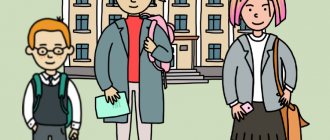Parents often wonder whether it is necessary to delegate some household chores to small family members. On the one hand, adults think that children shouldn’t be bothered with washing dishes or dishes, because childhood only happens once in a lifetime, so let the kids enjoy this wonderful period. On the other hand, if you do not involve children in housework, there is a likely risk of raising consumers who will believe that they are owed everything.
So, the child’s responsibilities around the house.
Psychologists believe that parents need to resort to the help of their children, because it is important for children to feel that they are indispensable. Children participate in everyday life and consider themselves full members of the family.
How can you teach your child to help around the house?
How can you teach your child to help around the house without making him hate housework? There is no need to protect your child from “difficult” tasks; you just need to give him tasks that are feasible and feasible at his age. Many are afraid that the child will get in the way and get underfoot. Yes, it will! But how can he learn how to cook Ossetian pies or wash dishes without this? It is common for us to feel the coolness of water, the softness of dough, the roughness of a waffle towel on our skin, but for a child this is a whole universe that you can open for him while doing such ordinary things as cooking, cleaning or washing. We are so mired in everyday life that we forget how fleeting our children’s childhood is. We will never remember burnt soup or an unwashed floor, but we will definitely remember the burning eyes of our child, who picked up a broom for the first time, tried to wash clothes for the first time, clumsily tries to mix the salad with a spoon that is too big for him. Don't deprive your children of the opportunity to be close to you and explore the world through cleaning up the house.
Of course, there are things that we must do without a child, for example, cleaning plumbing fixtures with products containing bleach and other chemicals that are not very useful for children. There are household chores that can be done in the presence of the child, but without his direct participation.
Child's responsibilities
Parents' uncertainty often stems from the fact that they do not know at what age what task will be feasible for the child. "So simple!" I have prepared an approximate, but not at all mandatory, list that will tell you what kind of work your little assistant can handle.
At 2 years old
- Sweep a floor.
- Wipe off dust.
- Help in the process of dressing.
- Place removed clothes on a high chair.
- Bring shoes for yourself or other family members when you find a pair.
- Help hang out washed laundry by handing over small items.
- Place disassembled laundry in the washing machine.
- Put toys back in their place.
At 3 years old
- Put away toys, books, choose your own clothes from the general pile of things.
- Dress yourself.
- Fasten and unfasten buttons on clothes.
- Help set the table - place napkins and cutlery.
- Put dishes away in the sink, wipe crumbs off the table.
- Show in familiar places where to go towards home.
- Share sweets or fruits equally among everyone.
- Play alone outside (under supervision, but without the participation of an adult).
At 4 years old
- Help wash dishes.
- Spread and make your bed.
- Help cutting salad.
- Make a simple dessert with an adult.
- Choose products in the store together with an adult, putting them in a cart.
- Prepare yourself a simple breakfast: get cereal and milk, make a sandwich.
- Hang small items on the drying rack.
- Play at home without constant supervision.
At 5 years old
- Help thread the needle.
- Wind the thread onto the spool.
- Pour yourself and everyone a cold drink.
- Pay for small purchases.
- Separate laundry for washing into white and colored ones.
- Sort cutlery in the kitchen cabinet and put it in order.
- Carefully hang things on the chair after undressing.
- Hang your outerwear in the closet.
- Put your clean laundry in the closet.
- Feed your pet.
- Clean up after your pet as directed by an adult.
- Picking berries.
At 6 years old
- Place the coins together, sorting them into piles of equal value.
- Separate washed small items into categories.
- Count the number of guests and help set the table according to the number of people, check that there is enough for everyone.
- Vacuum the room and carpets.
- Water the flowers.
- Help take out the trash.
- Use a rake in the garden.
- Prepare simple food yourself: a hot sandwich, boiled eggs.
- Collect your things for kindergarten, school, or group according to the written list.
At 7 years old
- Look at the clock with arrows and report the time.
- Help everyone tie their shoelaces in a bow.
- Choose your clothes according to the weather.
- Collect your own briefcase.
- Wash and peel vegetables.
- Leave the toilet and bathroom tidy after yourself.
- Bathing a pet.
- Walk with a small pet.
- Use the phone.
- Change batteries.
- Download applications to your phone.
At 8–9 years old
- Go to bed and wake up in the morning on your own according to the clock.
- Carry shopping.
- Sort out purchased products.
- Iron small things.
- Clean out your closet.
- Carry out various tasks for parents.
- Help with feeding younger children.
- Sew on buttons.
- Sew up a small ripped seam on clothing.
- Run baths for yourself and others.
- Collect fruits from trees.
- Light a fire and cook food over a fire with the participation of adults.
- Learn new culinary recipes from books and using search engines.
- Be able to paint a simple thing (door, table) with a brush.
At 10–11 years old
- Don't be afraid to be alone at home for a long time.
- Change your own bed linen.
- Place laundry in the washing machine.
- Know the rules of the road and cross the street independently.
- Go to visit the library.
- Shop according to the list in the store.
- Be able to prepare simple food for the family (peel and cook potatoes, chicken breast, omelet).
- Know how to provide first aid.
At 11–12 years old
- Travel by bus on your own.
- Help parents with important household chores (for example, making repairs).
- Manage a small amount of money.
- Be responsible about your hobby.
- Wash the stove and oven.
- Organize your own time for studying.
At 13–17 years old
- Cook for the whole family.
- Be able to help others in difficult situations.
- Go to bed and get up at a certain time without parental reminders.
- Have realistic ideas about your capabilities.
- Consistently implement decisions made.
- Understand the consequences of your actions.
Does your child have responsibilities at home?
Liberal education as a method has failed. It seems that kids these days can't get enough of harsh measures. Parents, it's time to come to your senses!
How can you become your grandchildren’s favorite without ruining your relationship with your children? First, remember these 10 safe phrases that a good grandmother will definitely never say.
Household responsibilities of a child 7 years old and older
Younger schoolchildren can handle washing dishes by hand. Do not try to clean up everything after your child yourself, reacting normally to the manifestation of independence and encouraging him.
Older children (8-12 years old) can purchase a pet to develop a sense of responsibility. The daily duties of caring for a four-legged pet can be alternated. For example: you can wash your dog’s paws after a walk one by one, without emphasizing this point. Just naturally assess the situation. If your child is heavily loaded with homework at school or is in a hurry to get to class, you should not insist on completing the procedure. Just help him, and children's gratitude will not keep you waiting.
Gradual, and most importantly joint, training in housework should not be a burden for parents and children. As the child grows up, he must offer help to his parents. Otherwise, there is a high risk of raising an egoist and a slob.
style=”display:block” data-ad-client=”ca-pub-2971630162946731″ data-ad-slot=”9213322149″ data-ad-format=”auto” data-full-width-responsive=”true”>
Responsibilities of children towards parents
The Family Code does not stipulate children's responsibilities towards their parents, which must be strictly fulfilled by them. Minor children only have rights. The expected responsibilities of a minor child in the family, which are dictated by logic, include:
- obedience;
- attentive and respectful attitude towards parents;
- getting an education;
- compliance with standards of behavior in the family and in public places;
- register at the military registration and enlistment office.
For violating the above obligations, the child does not face legal punishment, at most - curses from the parents.
The situation is different if the child has reached adulthood. According to Article 87 of the RF IC, the responsibilities of adult children include supporting their disabled mother and father and surrounding them with care. Failure to comply with this obligation may result in legal proceedings initiated by one of the parents. If the mother or father were previously deprived of parental rights, then such a citizen cannot claim alimony payments in old age.
Rights of minors according to the Constitution of the Russian Federation
The Constitution of the Russian Federation enshrines the basic powers of the baby, granted to him from birth. A small child has the right to:
- life;
- self-expression and development of personal qualities; assignment of the first name, last name and patronymic chosen by the parents during state registration of the birth of the baby;
- Russian citizenship at birth, even if the child’s parents are foreigners;
- knowledge of your biological parents, living and being raised in their family;
- development of capabilities and respect for human dignity;
- protection of their interests by parents, guardians, guardianship and trusteeship authorities, law enforcement agencies, prosecutor or court;
- use, taking possession, inheritance of property of parents and other relatives;
- use of the most advanced state medical healthcare services, medicines, provision of medical care free of charge;
- recreation and leisure (camps, sanatorium-resort institutions, etc.), participation in cultural events and manifestation of creative ambitions;
- protection from economic exploitation;
- protection from violence and harm to health (forced prostitution, taking narcotic or psychotropic drugs, slavery, kidnapping, smuggling).
Therefore, the state assigns minors various obligations corresponding to the child’s abilities.
In the legislation on the rights of children, the powers and obligations of minors are ranked depending on the number of completed years:
- from the age of one and a half years, the child can attend the nursery group of the kindergarten;
- from three – attend a preschool institution of municipal or private ownership;
- from the age of six - receive general secondary education at a public or private school, independently carry out small household transactions that do not require state registration or notarization, and also manage pocket money with the permission of legal representatives;
- from the age of eight - be a member or participate in a children's public association;
- from the age of ten - has the right to give consent to the restoration of parental rights, consent to change one’s data (first name, surname, patronymic), expressing a desire to remain with one of the parents after a divorce, consent to adoption or placement in a foster family;
- from the age of fourteen, the child becomes more conscious, a new stage of his growing up begins, therefore he is endowed with such powers as canceling adoption, agreeing to change his citizenship, can demand the establishment of paternity in court, dispose of earned money independently without the consent of his parents, and commit minor transactions and bear responsibility for them, exercise the rights of the author of intellectual property without the consent of legal representatives, independently go to court to protect your interests, work no more than 24 hours a week, be officially employed for the time free from educational activities and receive incentives for your work , annual paid leave lasting 31 days, has the right to unite in trade unions, have an identity document - a passport, moreover, a fourteen-year-old teenager is required to obtain one;
- from the age of fifteen, a child acquires the right to express his decision on medical intervention, to be hired on a part-time work schedule, if he has a document confirming completion of general secondary education;
- from the age of sixteen - a person has the right to work under a contract 35 hours a week, to be a member of a cooperative, to marry if there are significant reasons for this (pregnancy, threat to life), to exercise parental rights of his offspring.
From the moment of sixteen years of age until adulthood, all of the above powers are retained. Upon reaching the age of 18, an adult citizen acquires full legal capacity, which allows him to exercise all the rights and obligations established by state codes.
Documents regulating the rights and responsibilities of children
- The Constitution of the Russian Federation is the fundamental Russian document, the guarantor of the rights of Russians. Clause 2 art. 17 states that they are inalienable and are assigned from the first minute of birth, therefore, children also have them.
- The Federal Law of the Russian Federation “On Basic Guarantees of the Rights of the Child in the Russian Federation” (Federal Law No. 124) was adopted to provide a legal and socio-financial basis for the implementation of children’s rights.
- The Federal Law of the Russian Federation “On Education” (Federal Law No. 273) regulates all relations in the education system, for example, the adoption of new educational programs, conditions for teaching gifted children, certification of teachers, provision of hostels, psychological and pedagogical assistance in schools and kindergartens, and much more.
- The Family Code of the Russian Federation regulates all legal relationships within the family.
- Criminal Code of the Russian Federation.
Full criminal liability begins at the age of 16, partial - at the age of 14. Several times a legislative project was submitted to the State Duma for consideration to reduce this age to 12 years. The reason for this is that child crime is becoming more and more common.
- Regulatory legal acts of the constituent entities of the Russian Federation (region, territory, republic) and local government.
- Internal regulations of kindergartens and schools. All of them must be regulated by paragraph 1 of Art. 43 Federal Law No. 273. This paragraph describes in detail the student’s responsibilities: study conscientiously, prepare homework, improve one’s health, develop spiritually and morally, respect others (other minors and school or kindergarten employees), and take care of the organization’s property.
It is not only the Russian Federation that cares about minors. There is a list of international acts that protect the interests of children. The most important of them are the Declaration of the Rights of the Child and the UN Convention on the Rights of the Child.
It was at the global level that the decision was made to recognize a child as a person who has not yet reached 18 years of age. In our state it is duplicated in paragraph 1 of Art. 54 RF IC.
Art. 27 of the Civil Code of the Russian Federation makes it possible to become an adult before the age of 18. This procedure is called emancipation of a minor. The decision on emancipation is made by the court or the guardianship and trusteeship authorities. Boys and girls who are 16 years old can recognize themselves as fully capable.
Lies, threats and blackmail do not work
Don't take your lack of desire to help personally. What do we say when a child once again refuses to help and forgets to do what you asked him to do? We immediately think that he doesn’t respect us and doesn’t care that mom is tired and it’s hard for her. Ungrateful.
Forget about it. Change your attitude towards this situation. After all, despite the fact that your child is already quite old, at heart he is still a child who, just as before, wants care and attention. And since everywhere and everywhere they demand from him to be an adult, he wants to at least be a child at home. That is why there is such a protest and unwillingness to help.
You should not be offended by him, accuse him of ingratitude, threaten him with deprivation of pocket money or other punishments. This doesn't work with teenagers. Only calm conversations and your ingenuity.
We are a team
Even if not the first time, it is still necessary to convey to the teenager the idea that family is, first of all, mutual assistance and mutual assistance. Helping you around the house is an opportunity for someone to take care of you and show their love and respect. Each family member should make the other’s life as easy as possible. You cook dinner for the children, help with homework, and earn money to buy everything they need. And the teenager’s task is not only to study well, but also to help you with household chores.
What do we expect
Write a list of things that are easy for a teenager to do. This could be: mopping the floor, vacuuming, dusting, washing dishes. Anyone can handle such responsibilities. And at the same time, they do not take much time, but will make your life much easier.
Explain to your child that you do not expect him to perform tasks perfectly the first time.
It is valuable and important to you that he helps, thereby showing concern for you
Children's responsibilities
Many are interested not only in the rights of children, but also in their responsibilities. In recent decades, a common opinion has emerged: even preschoolers know very well what they are supposed to do, but completely forget about what they should do themselves.
Minors are obliged:
- obey parents (legal representatives), accept their attention and care;
- study conscientiously, engage in self-education and self-education;
- obey the charter and other local acts of the educational institution;
- know and follow the rules of behavior in society;
- don't break the law. Moreover, it should be remembered: ignorance of the law cannot exempt you from responsibility;
People are brought to administrative responsibility from the age of 16 (Article 2.3 of the Administrative Code).
- comply with the discipline adopted in the organization and the internal work rules (in case of getting a job);
- Young men who have reached the age of 17 are required to register with the military.
What should a 7-9 year old child be able to do around the house?
We have decided that household chores are not the exploitation of child labor, but the formation of important traits of human character, and therefore we proceed from theory to practice.
We determine the range of household responsibilities that a 7-9 year old child could take on:
- cleaning the apartment: vacuuming, sweeping, washing the floor, wiping off dust;
- lay out and hang your things in their places (hang clean clothes in the closet, and take dirty clothes to the washing machine or dirty laundry basket);
- monitor the condition of your shoes, wash them if necessary, and always put them back in place;
- independently assemble a briefcase and be responsible for its contents;
- water the flowers;
- carry light purchases, sort out bags of groceries when the family comes from the supermarket;
- take care of your pet: wash, feed, wipe paws, change the contents of trays;
- wash dishes and put them in their places;
- make your bed;
- set the table and wipe the table after eating;
- prepare basic meals: sandwiches, salad, morning porridge;
- help parents with preparing main dishes: grate carrots, chop onions, peel potatoes, pour water for soup or pasta into a saucepan and put on fire, boil eggs;
- sort and wash clothes in the washing machine, hang out the laundry (if you have a low floor dryer at home);
- know exactly what things he needs to wear to school or for a walk, where and in what closets they are located;
- help adults with younger brothers and sisters: stay close to the baby, feed, cheer, play, walk by the hand.
If you have a dacha or country house, a 7-9 year old child can easily help you:
- use a rake to remove last year's leaves,
- will become your partner in manual sawing of boards,
- together with an adult will be able to dig or bury a hole,
- water the beds yourself,
- collect ripe fruits and vegetables from the bushes.
Independence in exchange for time
The media happily pumps up parents with scary sensations to scare us into constantly monitoring our children. Then we send them to college. We must raise children so that over time they can confidently enter the big world, and for this they need to be able to solve many life issues themselves.
We treat our children as if they were physically or mentally handicapped royalty. This is what I call “good parent spoiling.” Loving, devoted, intelligent parents act as if their children, until they are 35 years old, cannot even wipe their butts, let alone walk half a block down the street.
Imagine you have six children. After all, if you had six kids, you wouldn’t have time to wipe everyone’s butts and give each one a pillow when he falls. It is important to clarify the concept of extreme necessity. An emergency is not when the child is a little naughty or a little hungry.
Family psychologist
One way to look at your children's help around the house is that their assistance will free up time for you to think about what you want to do. However, in reality, reducing your workload is not the point of pediatric care. When children have responsibilities, when they know that they can really help the family, they become stronger. They may at first be reluctant to set the table, pick up the mail, or feed the dog, but once they get involved and realize that they are really helping you, they will definitely feel more important and needed. They will have a purpose and an understanding that their contribution to the household is actually important to the entire family.
Returning to the question of the demands that we place on ourselves, it should be noted that most often we feel guilty if we do not have time to do at least a small fraction of all the homework.
Madness? Yes, but it happens all the time. Sometimes we don't realize it ourselves. We go about our daily work doing everything for everyone, and it doesn't even occur to us that we could assign a child to knock out a dusty rug and everyone would be better off for it.
Of course, you wouldn't ask a three-year-old to vacuum or a six-year-old to cook dinner, but there are many age-appropriate tasks that children can do as soon as they begin to understand language. A two year old can pick up the blocks and put them in a box. A six-year-old can easily get dishes out of the dishwasher, even if he just puts the dishes on the table rather than putting them away. An eight-year-old child can set the table and put away dirty dishes, a 10-year-old child can load the washing machine, and a twelve-year-old child can fold laundry. A teenager will walk the dog or change the cat litter; Children of this age are already quite capable of washing their clothes and even preparing a simple dinner.





